Taxation Law Assignment: Income Source and Double Taxation
VerifiedAdded on 2022/10/02
|6
|1060
|413
Homework Assignment
AI Summary
This assignment solution addresses a taxation law question, specifically focusing on the tax implications for an Australian resident working in China. The analysis centers on determining the source of income, considering whether the income is taxable under Australian law, and examining the application of the double taxation agreement between Australia and China. The student references relevant sections of the ITAA 1997 and ITAA 1936, along with case law such as *FCT v French (1957)*. The solution determines that the income is sourced in China and is exempt from tax in Australia under section 23AG ITAA 1936, with a potential foreign income tax offset available under Div 770 ITAA 1997 due to taxes paid in China. The assignment demonstrates an understanding of residency rules, income sourcing, and the impact of international tax agreements.
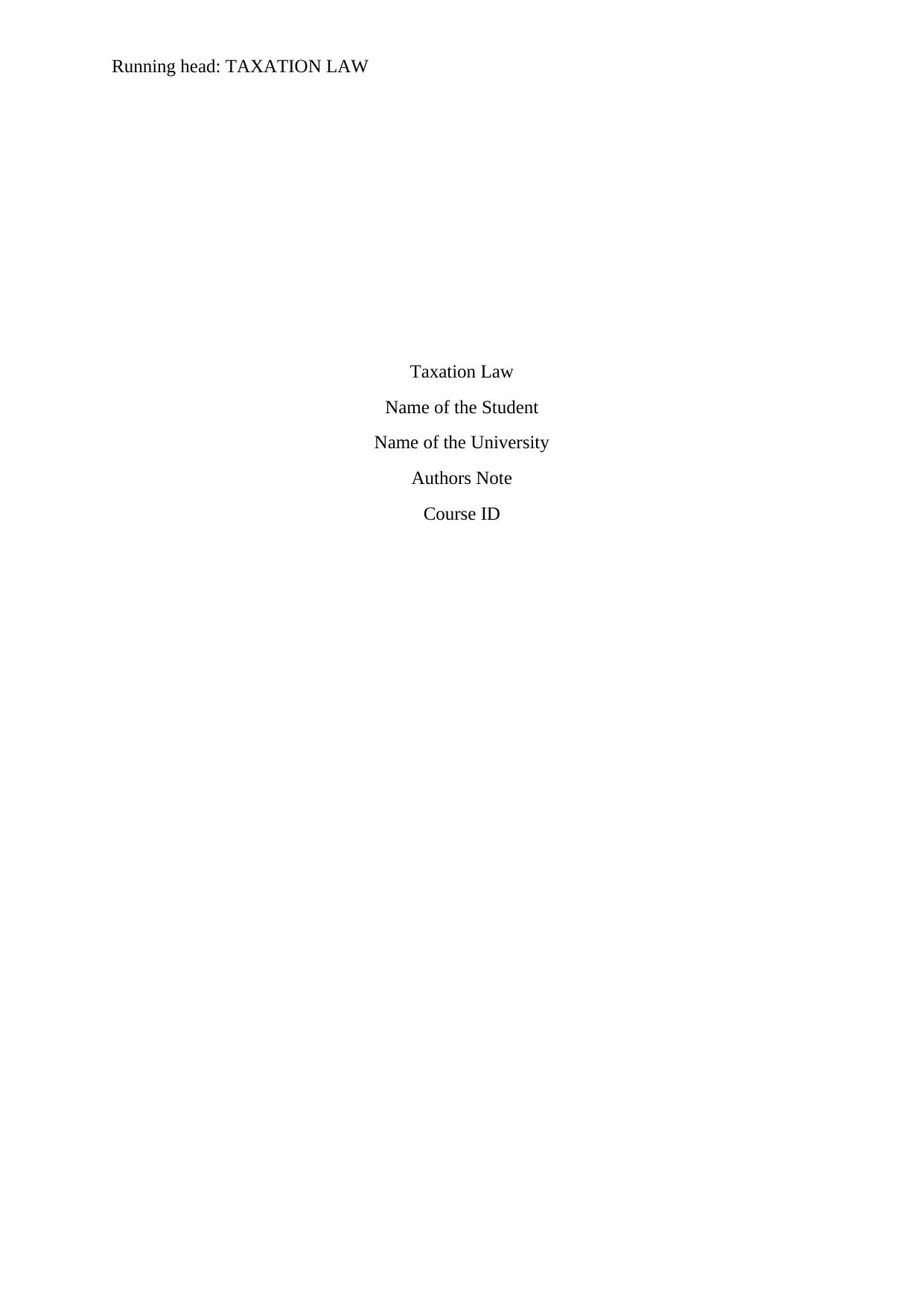
Running head: TAXATION LAW
Taxation Law
Name of the Student
Name of the University
Authors Note
Course ID
Taxation Law
Name of the Student
Name of the University
Authors Note
Course ID
Paraphrase This Document
Need a fresh take? Get an instant paraphrase of this document with our AI Paraphraser
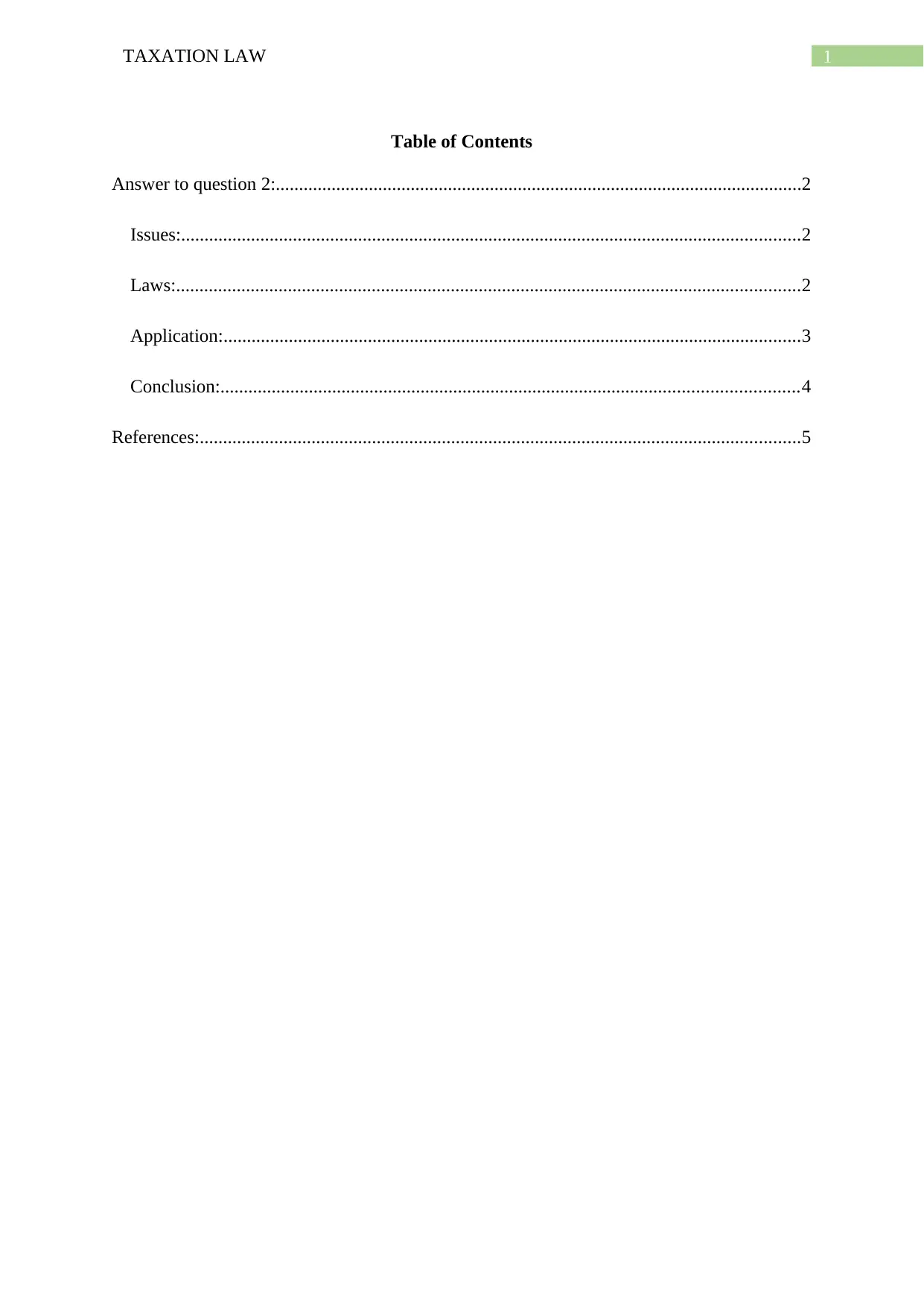
1TAXATION LAW
Table of Contents
Answer to question 2:.................................................................................................................2
Issues:.....................................................................................................................................2
Laws:......................................................................................................................................2
Application:............................................................................................................................3
Conclusion:............................................................................................................................4
References:.................................................................................................................................5
Table of Contents
Answer to question 2:.................................................................................................................2
Issues:.....................................................................................................................................2
Laws:......................................................................................................................................2
Application:............................................................................................................................3
Conclusion:............................................................................................................................4
References:.................................................................................................................................5
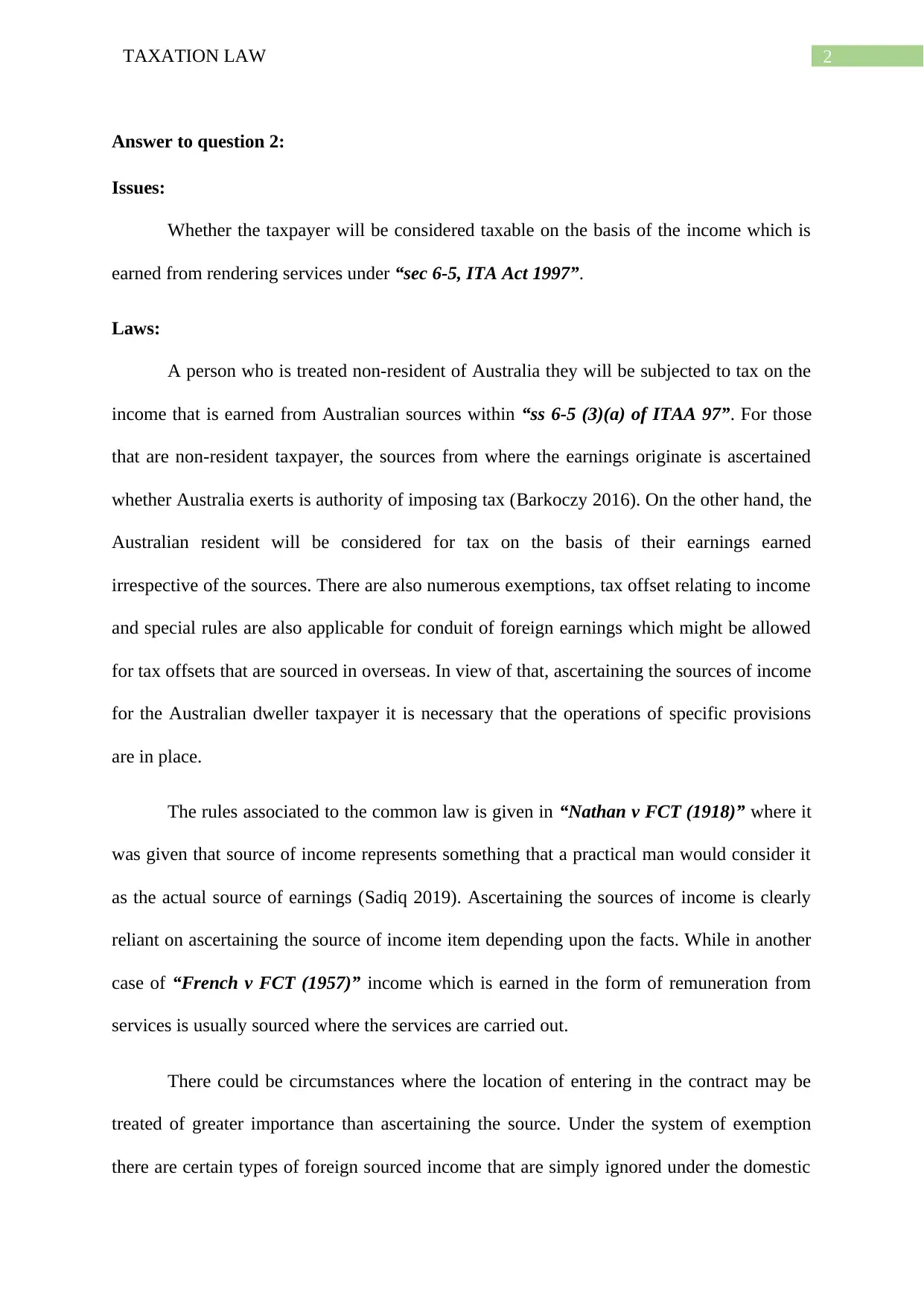
2TAXATION LAW
Answer to question 2:
Issues:
Whether the taxpayer will be considered taxable on the basis of the income which is
earned from rendering services under “sec 6-5, ITA Act 1997”.
Laws:
A person who is treated non-resident of Australia they will be subjected to tax on the
income that is earned from Australian sources within “ss 6-5 (3)(a) of ITAA 97”. For those
that are non-resident taxpayer, the sources from where the earnings originate is ascertained
whether Australia exerts is authority of imposing tax (Barkoczy 2016). On the other hand, the
Australian resident will be considered for tax on the basis of their earnings earned
irrespective of the sources. There are also numerous exemptions, tax offset relating to income
and special rules are also applicable for conduit of foreign earnings which might be allowed
for tax offsets that are sourced in overseas. In view of that, ascertaining the sources of income
for the Australian dweller taxpayer it is necessary that the operations of specific provisions
are in place.
The rules associated to the common law is given in “Nathan v FCT (1918)” where it
was given that source of income represents something that a practical man would consider it
as the actual source of earnings (Sadiq 2019). Ascertaining the sources of income is clearly
reliant on ascertaining the source of income item depending upon the facts. While in another
case of “French v FCT (1957)” income which is earned in the form of remuneration from
services is usually sourced where the services are carried out.
There could be circumstances where the location of entering in the contract may be
treated of greater importance than ascertaining the source. Under the system of exemption
there are certain types of foreign sourced income that are simply ignored under the domestic
Answer to question 2:
Issues:
Whether the taxpayer will be considered taxable on the basis of the income which is
earned from rendering services under “sec 6-5, ITA Act 1997”.
Laws:
A person who is treated non-resident of Australia they will be subjected to tax on the
income that is earned from Australian sources within “ss 6-5 (3)(a) of ITAA 97”. For those
that are non-resident taxpayer, the sources from where the earnings originate is ascertained
whether Australia exerts is authority of imposing tax (Barkoczy 2016). On the other hand, the
Australian resident will be considered for tax on the basis of their earnings earned
irrespective of the sources. There are also numerous exemptions, tax offset relating to income
and special rules are also applicable for conduit of foreign earnings which might be allowed
for tax offsets that are sourced in overseas. In view of that, ascertaining the sources of income
for the Australian dweller taxpayer it is necessary that the operations of specific provisions
are in place.
The rules associated to the common law is given in “Nathan v FCT (1918)” where it
was given that source of income represents something that a practical man would consider it
as the actual source of earnings (Sadiq 2019). Ascertaining the sources of income is clearly
reliant on ascertaining the source of income item depending upon the facts. While in another
case of “French v FCT (1957)” income which is earned in the form of remuneration from
services is usually sourced where the services are carried out.
There could be circumstances where the location of entering in the contract may be
treated of greater importance than ascertaining the source. Under the system of exemption
there are certain types of foreign sourced income that are simply ignored under the domestic
⊘ This is a preview!⊘
Do you want full access?
Subscribe today to unlock all pages.

Trusted by 1+ million students worldwide
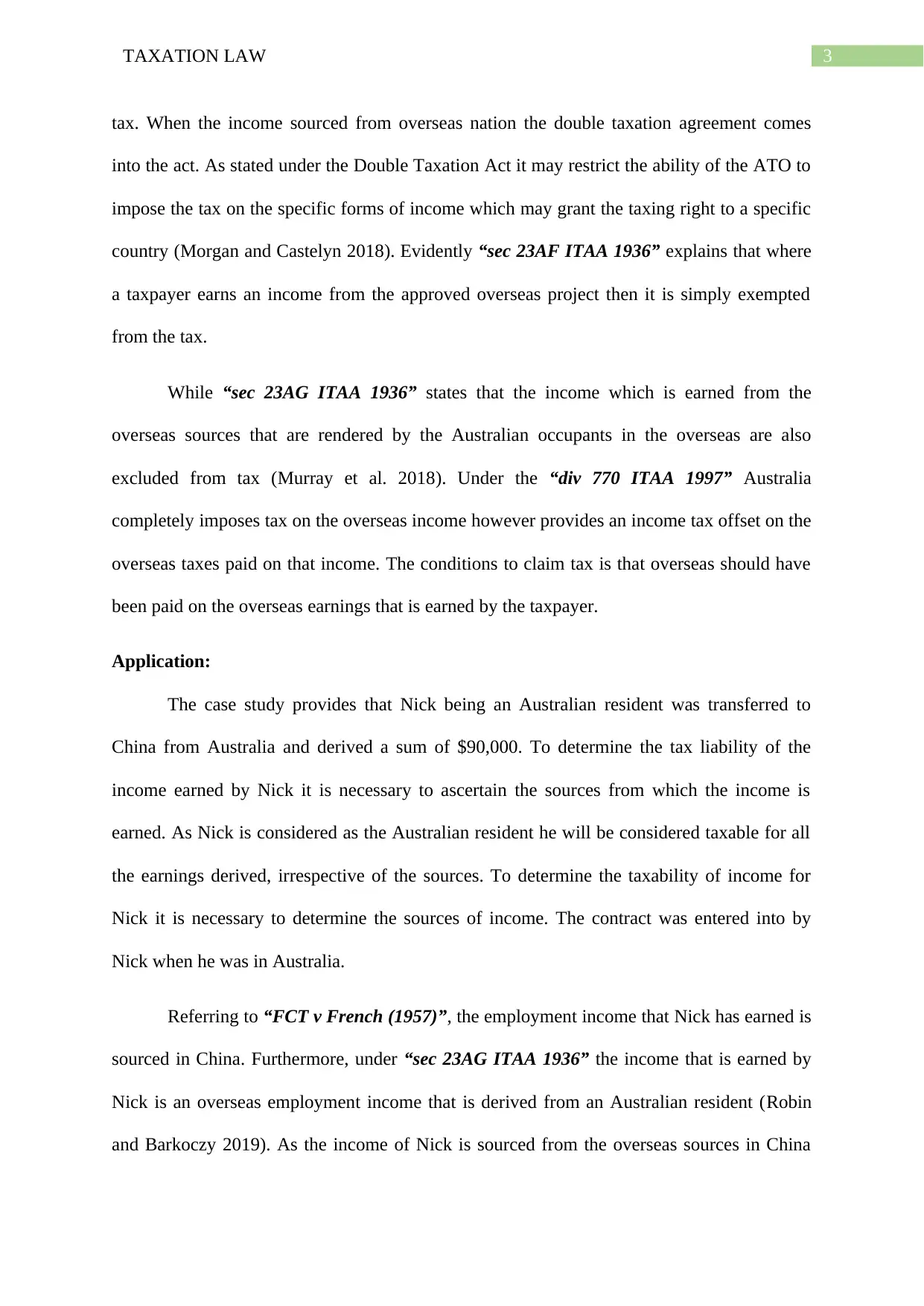
3TAXATION LAW
tax. When the income sourced from overseas nation the double taxation agreement comes
into the act. As stated under the Double Taxation Act it may restrict the ability of the ATO to
impose the tax on the specific forms of income which may grant the taxing right to a specific
country (Morgan and Castelyn 2018). Evidently “sec 23AF ITAA 1936” explains that where
a taxpayer earns an income from the approved overseas project then it is simply exempted
from the tax.
While “sec 23AG ITAA 1936” states that the income which is earned from the
overseas sources that are rendered by the Australian occupants in the overseas are also
excluded from tax (Murray et al. 2018). Under the “div 770 ITAA 1997” Australia
completely imposes tax on the overseas income however provides an income tax offset on the
overseas taxes paid on that income. The conditions to claim tax is that overseas should have
been paid on the overseas earnings that is earned by the taxpayer.
Application:
The case study provides that Nick being an Australian resident was transferred to
China from Australia and derived a sum of $90,000. To determine the tax liability of the
income earned by Nick it is necessary to ascertain the sources from which the income is
earned. As Nick is considered as the Australian resident he will be considered taxable for all
the earnings derived, irrespective of the sources. To determine the taxability of income for
Nick it is necessary to determine the sources of income. The contract was entered into by
Nick when he was in Australia.
Referring to “FCT v French (1957)”, the employment income that Nick has earned is
sourced in China. Furthermore, under “sec 23AG ITAA 1936” the income that is earned by
Nick is an overseas employment income that is derived from an Australian resident (Robin
and Barkoczy 2019). As the income of Nick is sourced from the overseas sources in China
tax. When the income sourced from overseas nation the double taxation agreement comes
into the act. As stated under the Double Taxation Act it may restrict the ability of the ATO to
impose the tax on the specific forms of income which may grant the taxing right to a specific
country (Morgan and Castelyn 2018). Evidently “sec 23AF ITAA 1936” explains that where
a taxpayer earns an income from the approved overseas project then it is simply exempted
from the tax.
While “sec 23AG ITAA 1936” states that the income which is earned from the
overseas sources that are rendered by the Australian occupants in the overseas are also
excluded from tax (Murray et al. 2018). Under the “div 770 ITAA 1997” Australia
completely imposes tax on the overseas income however provides an income tax offset on the
overseas taxes paid on that income. The conditions to claim tax is that overseas should have
been paid on the overseas earnings that is earned by the taxpayer.
Application:
The case study provides that Nick being an Australian resident was transferred to
China from Australia and derived a sum of $90,000. To determine the tax liability of the
income earned by Nick it is necessary to ascertain the sources from which the income is
earned. As Nick is considered as the Australian resident he will be considered taxable for all
the earnings derived, irrespective of the sources. To determine the taxability of income for
Nick it is necessary to determine the sources of income. The contract was entered into by
Nick when he was in Australia.
Referring to “FCT v French (1957)”, the employment income that Nick has earned is
sourced in China. Furthermore, under “sec 23AG ITAA 1936” the income that is earned by
Nick is an overseas employment income that is derived from an Australian resident (Robin
and Barkoczy 2019). As the income of Nick is sourced from the overseas sources in China
Paraphrase This Document
Need a fresh take? Get an instant paraphrase of this document with our AI Paraphraser
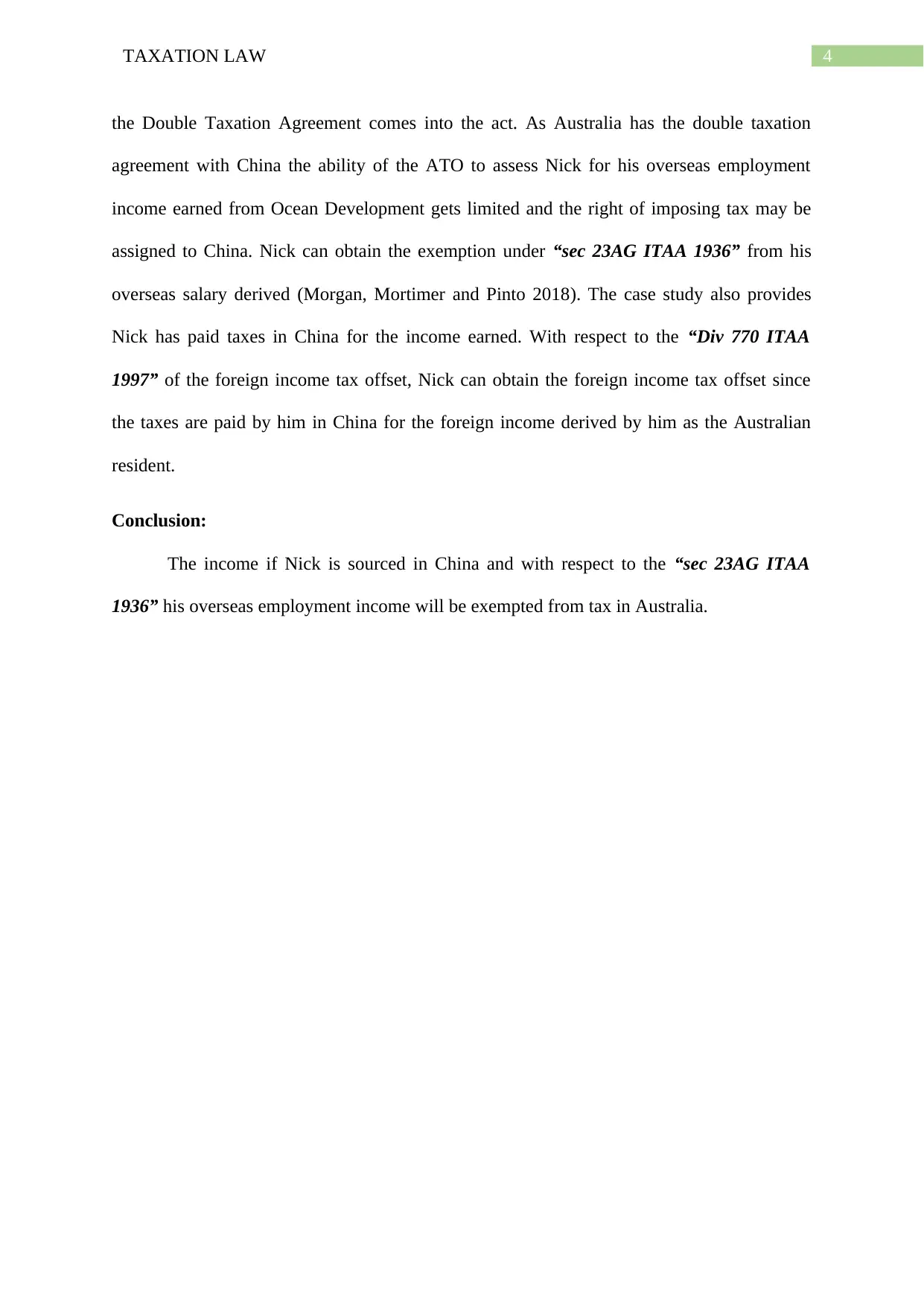
4TAXATION LAW
the Double Taxation Agreement comes into the act. As Australia has the double taxation
agreement with China the ability of the ATO to assess Nick for his overseas employment
income earned from Ocean Development gets limited and the right of imposing tax may be
assigned to China. Nick can obtain the exemption under “sec 23AG ITAA 1936” from his
overseas salary derived (Morgan, Mortimer and Pinto 2018). The case study also provides
Nick has paid taxes in China for the income earned. With respect to the “Div 770 ITAA
1997” of the foreign income tax offset, Nick can obtain the foreign income tax offset since
the taxes are paid by him in China for the foreign income derived by him as the Australian
resident.
Conclusion:
The income if Nick is sourced in China and with respect to the “sec 23AG ITAA
1936” his overseas employment income will be exempted from tax in Australia.
the Double Taxation Agreement comes into the act. As Australia has the double taxation
agreement with China the ability of the ATO to assess Nick for his overseas employment
income earned from Ocean Development gets limited and the right of imposing tax may be
assigned to China. Nick can obtain the exemption under “sec 23AG ITAA 1936” from his
overseas salary derived (Morgan, Mortimer and Pinto 2018). The case study also provides
Nick has paid taxes in China for the income earned. With respect to the “Div 770 ITAA
1997” of the foreign income tax offset, Nick can obtain the foreign income tax offset since
the taxes are paid by him in China for the foreign income derived by him as the Australian
resident.
Conclusion:
The income if Nick is sourced in China and with respect to the “sec 23AG ITAA
1936” his overseas employment income will be exempted from tax in Australia.
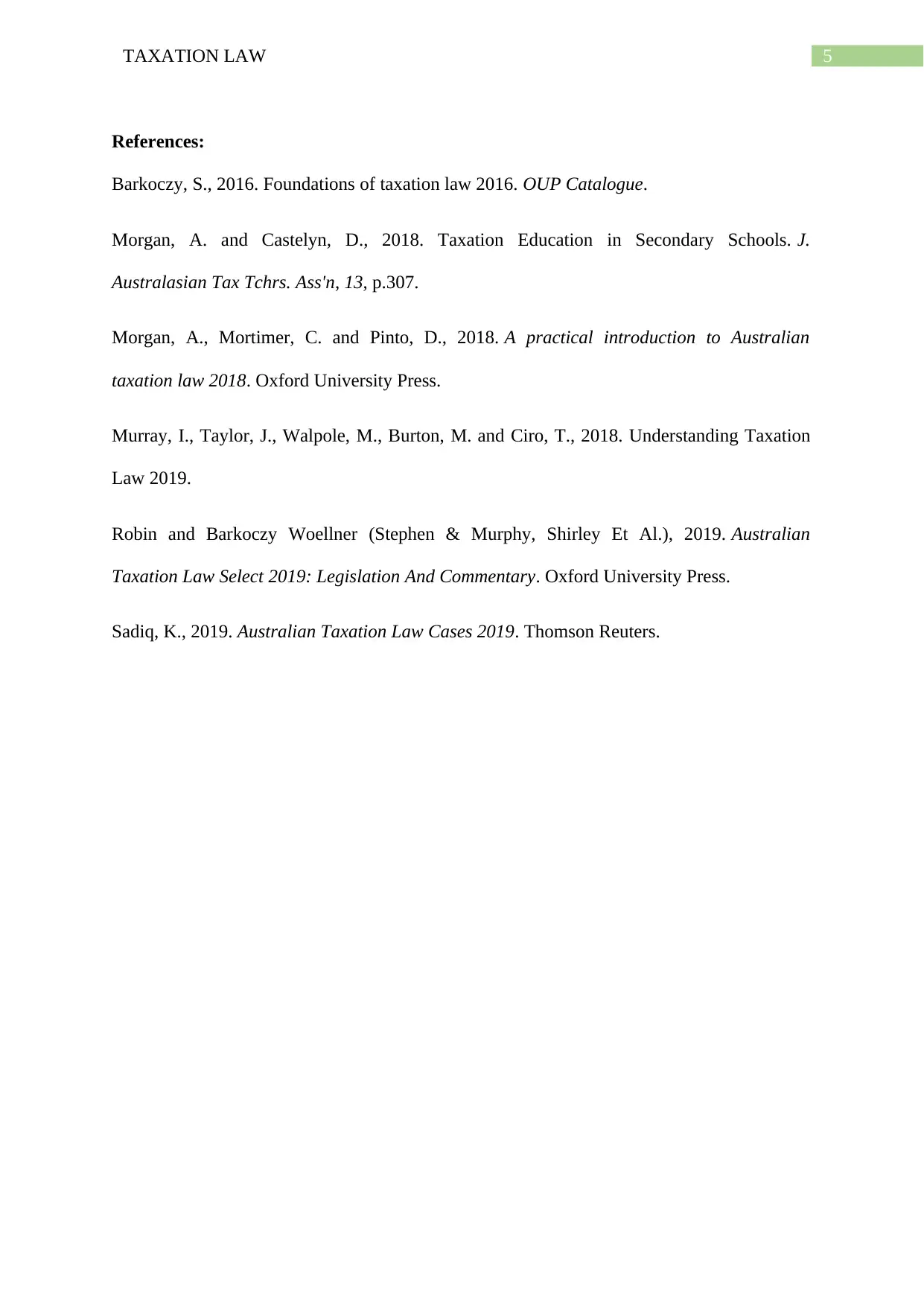
5TAXATION LAW
References:
Barkoczy, S., 2016. Foundations of taxation law 2016. OUP Catalogue.
Morgan, A. and Castelyn, D., 2018. Taxation Education in Secondary Schools. J.
Australasian Tax Tchrs. Ass'n, 13, p.307.
Morgan, A., Mortimer, C. and Pinto, D., 2018. A practical introduction to Australian
taxation law 2018. Oxford University Press.
Murray, I., Taylor, J., Walpole, M., Burton, M. and Ciro, T., 2018. Understanding Taxation
Law 2019.
Robin and Barkoczy Woellner (Stephen & Murphy, Shirley Et Al.), 2019. Australian
Taxation Law Select 2019: Legislation And Commentary. Oxford University Press.
Sadiq, K., 2019. Australian Taxation Law Cases 2019. Thomson Reuters.
References:
Barkoczy, S., 2016. Foundations of taxation law 2016. OUP Catalogue.
Morgan, A. and Castelyn, D., 2018. Taxation Education in Secondary Schools. J.
Australasian Tax Tchrs. Ass'n, 13, p.307.
Morgan, A., Mortimer, C. and Pinto, D., 2018. A practical introduction to Australian
taxation law 2018. Oxford University Press.
Murray, I., Taylor, J., Walpole, M., Burton, M. and Ciro, T., 2018. Understanding Taxation
Law 2019.
Robin and Barkoczy Woellner (Stephen & Murphy, Shirley Et Al.), 2019. Australian
Taxation Law Select 2019: Legislation And Commentary. Oxford University Press.
Sadiq, K., 2019. Australian Taxation Law Cases 2019. Thomson Reuters.
⊘ This is a preview!⊘
Do you want full access?
Subscribe today to unlock all pages.

Trusted by 1+ million students worldwide
1 out of 6
Related Documents
Your All-in-One AI-Powered Toolkit for Academic Success.
+13062052269
info@desklib.com
Available 24*7 on WhatsApp / Email
![[object Object]](/_next/static/media/star-bottom.7253800d.svg)
Unlock your academic potential
Copyright © 2020–2026 A2Z Services. All Rights Reserved. Developed and managed by ZUCOL.





